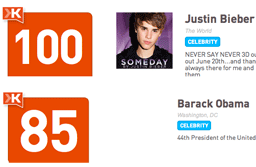 There has been a lot of talk online about the tools and companies that are trying to measure influence. Klout has gotten some of the most chatter lately (that I’ve seen at least), and that is a testament to how well Klout is running their business. The chatter varies from fans of the tool to haters calling them evil. The truth is that Klout can’t be any more evil, or good for that matter, than my hammer. It’s a tool.
There has been a lot of talk online about the tools and companies that are trying to measure influence. Klout has gotten some of the most chatter lately (that I’ve seen at least), and that is a testament to how well Klout is running their business. The chatter varies from fans of the tool to haters calling them evil. The truth is that Klout can’t be any more evil, or good for that matter, than my hammer. It’s a tool.
Some smart people came up with a process they feel measures the influence an individual has online, in a given subject. It’s not a perfect tool. I can’t see a way that there can ever be a perfect tool for measuring influence on a grand scale. What is an indisputable fact though, is that Klout recognized a hole in the marketing marketplace. There is great demand for a service that identifies online influencers. Influence has been the golden goose of marketing since the first time a caveman sold a stick on fire to another caveman. Klout identified a need and came up with a way to fill it. That’s great business! That’s what we teach budding entrepreneurs isn’t it?
Others, like Hootsuite (affiliate), believe it is a useful tool, and integrated it into their own tools. Companies like Virgin Atlantic and motion picture distributors for films like HOP, also believe it is a useful tool and have paid the company to help promote their products. So why all this debate about the validity of Klout?
I think it is that we get caught up on term “influence“. I believe that true influence is nearly impossible to measure accurately at scale. Reach on the other hand gets easier to measure every day. You can measure Twitter followers, Facebook friends and LinkedIn connections. You measure blog comments and Likes, and Plus 1’s. You can measure the reach of a post across the web.
So yes, measuring how many people pass on a tweet, and who they are, and who the people they share it with are, and so on, can be measuring reach more than influence. Unless of course that tweet had a link to an offer that resulted in sales. That would be influence, no? So the data that is being measured is a factor in whether the result is reach vs influence too?
Scott Stratten (of Unmarketing fame) has a huge online following, which he has earned by being a fantastic marketer and speaker. He was recently hired to help promote Magnum Ice Cream . Here is where the line between reach and influence starts not to matter. I would never buy ice cream because Scott said it was great. I couldn’t care less what Scott thinks about ice cream. But I now know Magnum Ice Cream exists because of Scott Stratten. I walk down the ice cream aisle (which I have been known to go out of my way to do) and I see Magnum Ice Cream, and they have done a good job with packaging so it looks great when I see it, and the flavor sounds good to me, so I buy it. Not because Scott said to, but because he put it on my radar, and the company took it the rest of the way home. (Also because a new ice cream would pretty much have to look like vomit for me not to try it).
I have a Tassimo coffee maker. I think I’m the only one in Canada with a twitter account that actually had to buy one. I love this thing. I have personally sold at least 6 machines that I know of, by telling people how great they are. I have had exactly the kind of influence they were looking for when they gave the machines out to people with online reach. They have an awesome product. They don’t need influence. They needed reach.
Sometimes, LOTS OF TIMES, reach is what you need. If you are awesome, reach is what you need. Because if others get you the reach, you should be able to handle the influence yourself.
Comments
2 responses to “Reach, Influence, and the Marketing of Marketing”
Ian, great piece sir! You nailed it! We need the reach to realize our true potential. At the same time, we can offer others the reach they require which is where true business networking resides. And when we lack the reach, we can often think our abilities and experience are not strong enough to accomplish what we want. Nice work sir, inspiring post!
That’s an excellent point about the lack of reach giving us the wrong impression that it is our ability that is lacking. It’s important not to get discouraged while building your network. Thanks for weighing in!